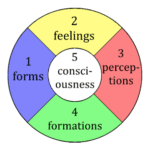
- Increased Confidence
- More energy
- Peak Performance
- Greater compassion
- Sense of humor
- Joy
- Greater Focus
- Mental Clarity
- Creativity
- Health
- Heart Rate drops
- Breathing slows and stabilizes
- Grounded in the Now
Table of Contents
10 Benefits of meditation #1: Increased Confidence and Energy
Due to the calmness and decreased stress response, meditation generates a relaxed mind. This release of nervous uncertainty brings up confidence. This gets us out of our own way, creating more energy.
I feel more energized after a strong meditative experience personally. But it is more of a settled awake way. I don’t have the coffee type jag. Sometimes, however, after intense meditation, I can feel so much energy that it is difficult to relax.
Bonus benefit: Meditation overcomes Anxiety
Properly practiced, meditation has been shown to overcome anxiety. This can be done in many ways, so whatever a person’s disposition or challenges, they can meditate to conquer anxiety. Studies:
- Title: “Meditation programs for psychological stress and well-being: a systematic review and meta-analysis”
- Authors: Goyal M, Singh S, Sibinga EM, et al.
- Published in: JAMA Internal Medicine, 2014.
- Link: JAMA – Meditation programs for psychological stress and well-being
- Title: “Mindfulness practice leads to increases in regional brain gray matter density”
- Authors: Hölzel BK, Carmody J, Vangel M, et al.
- Published in: Psychiatry Research: Neuroimaging, 2011.
- Link: PubMed – Mindfulness practice leads to increases in regional brain gray matter density
- Title: “The underlying anatomical correlates of long-term meditation: Larger hippocampal and frontal volumes of gray matter”
- Authors: Luders E, Toga AW, Lepore N, et al.
- Published in: NeuroImage, 2009.
- Link: PubMed – The underlying anatomical correlates of long-term meditation
- Title: “The effects of mindfulness-based stress reduction on sleep disturbance: a systematic review”
- Authors: Rusch HL, Rosario M, Levison LM, et al.
- Published in: Explore: The Journal of Science and Healing, 2015.
- Link: PubMed – The effects of mindfulness-based stress reduction on sleep disturbance
Peak Performance from Meditation: Benefit #2
Markov Sarekla, MD, a neurologist at Washington University, used MRI technology to show the brain – when we’re not doing anything active – is in fact doing something very powerful. They call it the default mode, but it’s a highly active background mode that works below the conscious mind. This mode of mind shuts down when the mind is engaged in a directly concentrated task.
This is the mind that can be engaged in meditation. It also brings about spontaneous insights and creative breakthroughs.
To access peak performance, stopping the incessant flow thoughts is necessary. Resting in the basic state of mind is a trigger. Meditation is obviously ideal for that.

Flow, the profound mental state, also called Peak Performance, can be attained with meditation and can be ‘triggered’ at will, with enough discipline. Guide to Flow Mastery will teach you how.
Benefit of meditation #3-4: Greater Compassion and sense of humor
Another huge benefit is greater compassion. Meditating lessens the focus on self. This in turns opens up focus on others. Their pains and joys are much clearer. You can see in their face how they may be hurting. Or happy. Through meditation, you can share in their happiness and maybe alleviate their pain. This leads to a wonderful benefit: joy.
Meditation Benefit #5-6: Greater focus and mental clarity
Meditation is defined as focus on an object, so greater focus is automatic. Focusing better IS meditation, so when we meditate, we’re developing our capacity to focus even better. This can continue, with proper practice, in an indefinite virtuous cycle. Focus can become total. This is called samadhi.
This also creates tremendous mental clarity. Why? Fuzziness and confusion in the mind arise from excess thoughts. The mind becomes split into different strains. This generates a mental fog or a cloud that makes it hard to see any one thing properly. By focusing on only a single thing and training the mind to do so, clarity emerges as a natural offshoot.
Meditation Benefit #7: Joy
Most of the suffering in life comes from focusing too much on ourselves, especially our suffering. When we don’t do that, when we focus on others, that suffering becomes smaller in our mind, simply because we’re not obsessing on it. If we do this really well, we forget about our suffering altogether. It turns out that a lot of religions are correct: thinking of others leads to happiness.
Health Benefits of Meditation: #8
Engaging in regular meditation reduces stress levels, lowers blood pressure, and improves overall mental well-being. The practice fosters mindfulness, promoting a heightened awareness of the present moment and aiding in stress management by mitigating the detrimental effects of chronic stress on the body.
Moreover, meditation has shown positive impacts on mental health, with studies suggesting a reduction in symptoms of anxiety and depression. As individuals cultivate a regular meditation practice, they often experience enhanced emotional resilience, better concentration, and improved sleep patterns. The physiological benefits extend to the immune system, as meditation has been associated with strengthened immune responses. Collectively, the health benefits of meditation underscore its holistic impact, offering individuals a simple yet powerful tool to foster both mental and physical well-being.
The following meta-analysis, published in the Journal of the American Medical Association (JAMA), examines the impact of meditation programs on stress reduction and overall well-being, drawing on a wide range of studies. It provides a comprehensive overview of the scientific evidence supporting the positive effects of meditation on mental health, stress management, and general psychological well-being.
- Goyal, M., Singh, S., Sibinga, E. M., Gould, N. F., Rowland-Seymour, A., Sharma, R., … & Ranasinghe, P. D. (2014). Meditation programs for psychological stress and well-being: a systematic review and meta-analysis. JAMA Internal Medicine, 174(3), 357-368.
One study showed benefits of Transcendental Meditation on cardiovascular risk factors in African American adolescents. It found that participants practicing TM showed significant reductions in resting heart rate compared to the control group. The study contributes to the body of research supporting the idea that meditation, in this case, TM, can have a positive impact on cardiovascular health, including a reduction in resting heart rate, which is indicative of improved overall cardiovascular function.
Effects of the transcendental meditation program on cardiovascular risk factors for African American adolescents. Barnes, V. A., Treiber, F. A., & Johnson, M. H. Ethnicity & Disease, 2004; 14(3 Suppl 1), S114-118.
Meditation slows the breathing and evens it out. Reduced breathing rate is shown to be healthier for a variety of reasons. Body metabolizes oxygen better. Slower breathing induces calm. It activates the parasympathetic nervous system. It brings the mind into focus. Even breathing steadies the mind against adversity and difficult situations. Uneven breathing causes health issues and nervousness.
Meditation Benefit #9: Creativity
Engaging in regular meditation has been associated with enhanced divergent thinking, a key component of creativity that involves generating a multitude of ideas and solutions. Through practices that promote an open and non-judgmental awareness, meditation helps individuals break free from cognitive rigidity and tap into their innate creativity.
A study by Colzato, Ozturk, and Hommel (2012) investigated the relationship between meditation and creativity, finding that mindfulness meditation specifically facilitates the generation of original ideas and promotes cognitive flexibility. Incorporating meditation into one’s routine not only contributes to overall well-being but may also serve as a valuable tool for unlocking and nurturing creative potential.
Reference: Colzato, L. S., Ozturk, A., & Hommel, B. (2012). Meditate to create: the impact of focused-attention and open-monitoring training on convergent and divergent thinking. Frontiers in Psychology, 3, 116. doi: 10.3389/fpsyg.2012.00116.
Meditation Benefit #10: Grounded in the Now
Remaining in the present moment, often cultivated through mindfulness practices like meditation, has been associated with a myriad of mental and physical health benefits. Mindfulness, defined as non-judgmental awareness of the present experience, has been shown to reduce stress and anxiety (Kabat-Zinn, 1990).
Regular mindfulness practice can enhance cognitive functioning, improve attention, and increase overall psychological well-being (Brown & Ryan, 2003; Jha, Krompinger, & Baime, 2007). Physiologically, staying present has been linked to reduced levels of the stress hormone cortisol (Creswell et al., 2007) and improvements in immune function (Davidson et al., 2003). Moreover, mindfulness practices have been integrated into therapeutic interventions for various conditions, showcasing their versatility in promoting mental health and resilience (Baer, 2003). Collectively, these findings underscore the profound and holistic benefits of cultivating an awareness of the present moment.
- Kabat-Zinn, J. (1990). Full Catastrophe Living: Using the Wisdom of Your Body and Mind to Face Stress, Pain, and Illness. Delta.
- Brown, K. W., & Ryan, R. M. (2003). The benefits of being present: Mindfulness and its role in psychological well-being. Journal of Personality and Social Psychology, 84(4), 822–848.
- Jha, A. P., Krompinger, J., & Baime, M. J. (2007). Mindfulness training modifies subsystems of attention. Cognitive, Affective, & Behavioral Neuroscience, 7(2), 109–119
Secrets of Meditation for Anxiety
Like millions of people, you may have suffered from anxiety for years. Meditation, yoga, peaceful music – it never works. It takes too long, and it’s not stable. Why? Because peace is treated as a cause for freedom, but it’s not – it’s the result. The cause to free yourself from anxiety is completely different.
Click now to Overcome Anxiety for good.
Bonus Meditation Benefit: Ending the Stress Response
Amygdala hijack occurs when the mind is stressed or anxious for no reason. The response can become overwhelming, disrupting the person from any rational thought or control. It is a fear cascade, in essence.
Another team tested highly experienced meditators against non-meditators in MRI machines is, again, and subjected them to physical pain afterward. The non-meditators continue to experience high levels of amygdala activity. The amygdala is responsible for fear and stress. The experienced meditators, however, were able to quickly shut this response down and no longer be subject to it. They simply stopped the stress response.

May all beings be happy
May all beings be peaceful
May all beings be safe
May all beings awaken to the light of their true nature
May all beings be free








